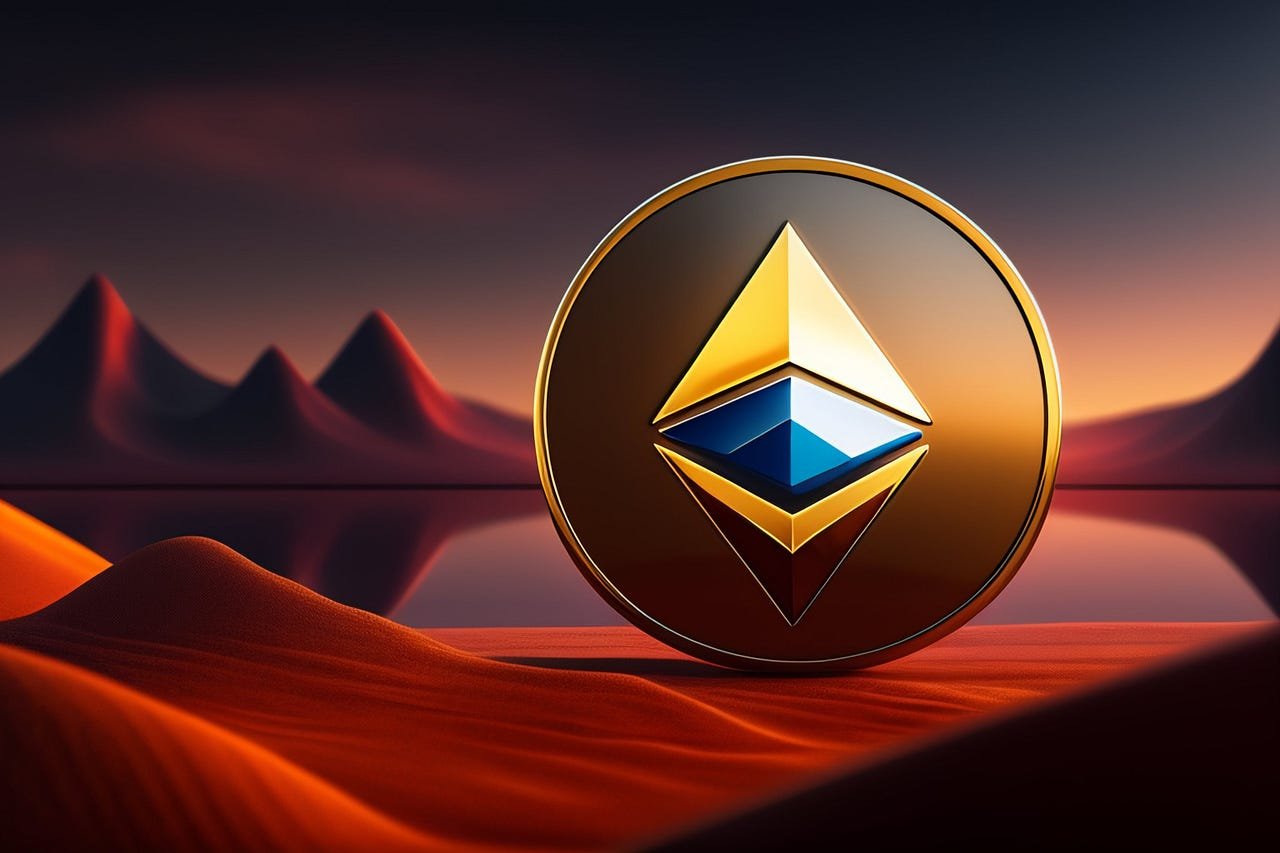Blockchain Industry Weekly Report | Ministry of Industry and Information Technology: Guiding the Platform to Enhance New Technology Support Capabilities

The report produced by the fire block chain coins Institute, 2020 Report Published March 23, author: Yuan Yuming, Rui
Summary:
- Smart contracts eliminate information asymmetry, build trust, and upend traditional insurance models
- Is there any change in the cooperation between the self-built blockchain team of Zhongzhuang Construction and Yange Information?
- Gates and Li Ka-shing's blockchain business: one in the chain and one in the currency
Domestic hotspots:
1. Ministry of Industry and Information Technology: guide the platform to enhance the support of new technologies such as blockchain.
2. The first real estate "assessment chain" in China will be launched with a full range of real estate assessments using blockchain technology. In the future, China's real estate series of assessments will all adopt the "assessment chain". Blockchain technology is used to ensure the reliability of the assessment data source and thus the authority of the assessment results.
3. The three departments of Shanghai jointly issued a document to promote the development of the new economy by using technologies such as blockchain.
4. Former Vice President of Bank of China: Bitcoin cannot be "digital gold". Wang Yongli, a former deputy governor of the Bank of China, said in a Sina column that bitcoin, although highly imitating the mechanism of gold, is not really gold at all.
Industry applications:
1. Argentina's natural gas regulatory agency launched a blockchain network to expand nationwide. Argentina's natural gas regulator, Enargas, has approved the expansion of a blockchain-based natural gas distribution tracking platform.
2 . The new blockchain system is used to track individuals who are not infected with high-risk viruses. A consortium announced the release of a blockchain-based system for tracking the movements of individuals who are not infected with high-risk viruses.
3. Australian farmers' blockchain: a shield against climate degradation. Blockchain technology is the solution that Australia has been looking for.
International policy:
1. The Monetary Authority of Singapore issues anti-money laundering / terrorist financing guidelines .
2. The Korean government will provide $ 3.2 million in funding to blockchain companies. Two South Korean ministries have announced support for the country's blockchain industry and plan to allocate up to $ 3.2 million to local startups to encourage the use of such technologies.
3. The Swedish Central Bank hopes to host a digital currency innovation center. The Swedish Central Bank (Riksbank) began testing its own Central Bank Digital Currency (CBDC) in February, hoping that the Bank for International Settlements (BIS) will host the Digital Currency Innovation Center.
Bitcoin hashrate has declined this week. Bitcoin mining difficulty this week has increased, the average size of Bitcoin blocks this week has increased, and the average number of block transactions has increased; Bitcoin miner fees have increased this week;
According to the data calculated by blockchain.info, as of March 22, the total number of blockchain wallet users reached 46,797,409, an increase of 0.44% from last week.
ZSC is the most active github code project this week. From March 15, 2020 to March 22, 2020, ZSC was the most active in github code, with a total of 81 commits this week.
A total of 2 investment and financing projects in the blockchain industry were counted this week. The sandbox received a strategic investment of USD 2.01 million, and FundsDLT received a round A investment.
Report body
1. Blockchain Weekly News
1.1 Domestic Hotspots
1. Ministry of Industry and Information Technology: guide the platform to enhance new technology support capabilities such as blockchain
The General Office of the Ministry of Industry and Information Technology issued a notice on accelerating the development of the Industrial Internet. Guide the platform to enhance new technology support capabilities such as 5G, artificial intelligence, blockchain, augmented reality / virtual reality, and strengthen the integration of digital functions in the entire process of design, production, operation and maintenance, and management. Select 10 cross-industry and cross-domain platforms and develop 50 key industry / regional platforms. Promote the key platforms to support an average of 200 industrial protocols, 800,000 industrial equipment connections, and 2,500 industrial APPs.
2. The first real estate "assessment chain" in China will be launched on the real estate series of assessments that will fully apply blockchain technology
According to Leju Finance and Economics News, on March 19, China's first real estate "assessment chain" was launched. This is E-House China following the launch of the three major property management systems on the community, the case, and the building on March 2. After the launch of the public disk chain in the field of second-hand housing transactions on March 11, the application of the blockchain in the real estate industry has made another breakthrough. . On March 18th, Feng Jun, President of the China Real Estate Association, announced at the 2020 China Real Estate 500 Top 500 Results Evaluation Conference that China's real estate series of assessments will all use the "assessment chain" in the future, and use blockchain technology to ensure the evaluation of data sources. Reliability, thus ensuring the authority of the evaluation results.
3. The three departments in Shanghai jointly issued a document to promote the development of the new economy by using technologies such as blockchain
Recently, the United Front Work Department of the Shanghai Municipal Committee, the Civil Affairs Bureau (City Administration of Social Organizations), and the City Federation of Industry and Commerce (General Chamber of Commerce) jointly issued the "Notice on Actively Bringing the Role of Industry Associations and Chambers of Commerce to Support the Resumption of Production and Resumption of the Production and Resumption of SMEs in the Private Enterprise" It is necessary to use 5G, blockchain, Internet, artificial intelligence, big data and other technologies to focus on the three tasks entrusted by the central government to Shanghai and the work of the Municipal Party Committee and Municipal Government Center to actively attract business, secure business, and explore new formats and models to promote new businesses. economic development. Third, based on domestic demand, tightly grasp consumer demand, provide contactless services such as online office, online shopping, takeaway meal ordering, and online entertainment to further promote the development of the consumer economy.
4. Former Vice President of Bank of China: Bitcoin is unlikely to become "digital gold"
Recently, Wang Yongli, a former deputy governor of the Bank of China, stated in a Sina column that although Bitcoin highly mimics the mechanism of gold, it is not real gold at all and can only be digital "virtual gold" or "virtual assets". Affected by the new coronavirus epidemic, the prices of "digital currencies" such as Bitcoin have plummeted, with prices falling by two-thirds within a week. People should fully realize that they cannot become "digital gold", nor can they become strong currencies or safe-haven assets. They should be completely shaken from the illusion of various "digital currencies" and have a sober and accurate recognition of currencies. know.
1.2 Industry Applications
1.Argentine gas regulator launches blockchain network to expand nationwide
Argentina's natural gas regulator, Enargas, has approved the expansion of a blockchain-based natural gas distribution tracking platform. The system has been piloted by local distributors to serve 2 million residents. According to a March 18 announcement, a system called Gasnet has been approved for expansion across the country. Until then, the network was only used by Gasnor, a local gas distributor with 2 million customers. As technology can help manage complex ecosystems and supply chains, blockchain is becoming increasingly useful in the fossil fuel industry. As an analysis in February showed, oil companies have started using blockchain to make the industry safer, cleaner, and more efficient.
2. New blockchain system to track individuals who are not infected with high-risk viruses
A consortium announced the release of a blockchain-based system for tracking the movements of individuals who are not infected with high-risk viruses. The Netherlands-based Public Health Blockchain Alliance (PHBC) announced that it has released a blockchain-based system for tracking mobile data of individuals who are not infected with high-risk viruses. This system is designed to help healthy people avoid potentially life-threatening diseases. This product release, announced by PHBC on March 19, details that the blockchain-based platform will systematically, continuously, and anonymously verify communities and workplaces, so that these communities and workplaces are not exposed to viruses including coronaviruses. Of dangerous viruses.
3. Australian farmers' blockchain: a shield against climate degradation
Australian farmers are too familiar with the dry and unstable weather conditions that affect daily operations. Reports over the past 20 years have shown that these conditions will only worsen-an increase in climate is estimated to reduce annual profits by 22%. The current wildfire season has had a disastrous impact on the agricultural industry. NASA mapping data estimate that 8.6 million sheep and 2.3 million livestock in NSW and Victoria were affected, and about 500,000 livestock were killed. Agriculture is becoming more and more unpredictable, and the possibility of forest fire seasons is increasing and lasting longer. As climate growth becomes a more pressing issue, workflow and data sharing solutions will face even greater pressure. Obviously, blockchain technology is the solution that Australia has been looking for. As farmers seek to rebuild their land and livelihoods, agricultural innovation is recommended to increase the productivity, profitability and environmental sustainability of their agricultural operations.
1.3 International policy
1. Monetary Authority of Singapore issues anti-money laundering / terrorist financing guidelines
Some countries are late in recognizing and regulating digital assets. The Central Bank of Singapore passed the Payment Services Act on January 28 for the first time to publish a framework for regulating payment-related activities. However, the Monetary Authority of Singapore (MAS) still sees the potential risks that digital assets can pose to the economy, such as money laundering and the financing of terrorism. To address this, the HKMA issued a notice on December 5 on "preventing money laundering and combating the financing of terrorism." The notice details anti-money laundering (AML) and counter-terrorism financing (CFT) requirements for digital payment token service providers-including risk assessment and risk mitigation, customer due diligence, reliance on third parties, agency accounts and wire transfers, records Reservations, suspicious transaction reports and internal policies.
2. South Korean government will provide $ 3.2 million in funding to blockchain companies
Two South Korean ministries have announced support for the country's blockchain industry and plan to allocate up to $ 3.2 million to local startups to encourage the use of such technologies. According to the March 16 report, the Ministry of Science and Information and Communication Technology (ICT) and the Ministry of Information and Communication Industry Promotion will launch a pilot program called "Blockchain Technology Validation Support 2020" to implement the project. The plan plans to select nine projects through free public offerings and provide funding for each project of no more than 450 million won ($ 360,000). The selection criteria for the plan include excellent current performance, feasibility of future performance, feasibility of technical verification, reliable business goals and savvy expected results, and the level of work expected to be created.
3. Swedish central bank hopes to host digital currency innovation center
The Swedish Central Bank (Riksbank) began testing its own Central Bank Digital Currency (CBDC) in February, hoping that the Bank for International Settlements (BIS) will host the Digital Currency Innovation Center. The Swedish central bank formally announced the news on March 6 and noted that in order for the hub to be located in Sweden, the bank will need to take multiple measures to co-finance the event. As a result, the Bank of Sweden has proposed an amendment to the Swedish National Bank Act requiring the Swedish Parliament to approve funding for the activities of international organizations. If the Bank for International Settlements chooses to establish a hub in Sweden, the Dutch central bank requires parliament to approve co-financing such activities for a period of five years, with a maximum fee of SEK 30 million (US $ 3.1 million) per year. The Bank of Sweden referred the amendment proposal on January 23, 2020 and noted that most referral agencies (such as other authorities, organizations and stakeholders) either supported the proposal or did not object to it.
2. Technical capability analysis
2.1 Cryptocurrency Production Difficulty and Revenue Analysis
Bitcoin hashrate has declined this week. From March 16, 2020 to March 22, 2020, the average hashrate of the entire Bitcoin network was 94.63EH / s, which was a decrease of 16.77% from the previous week.
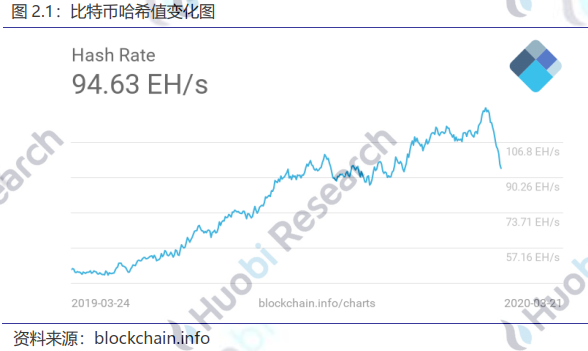
Bitcoin mining difficulty has increased this week. As of March 22, 2020, bitcoin's mining difficulty this week remained at 16.55T, which was an increase of 2.29% from last week.
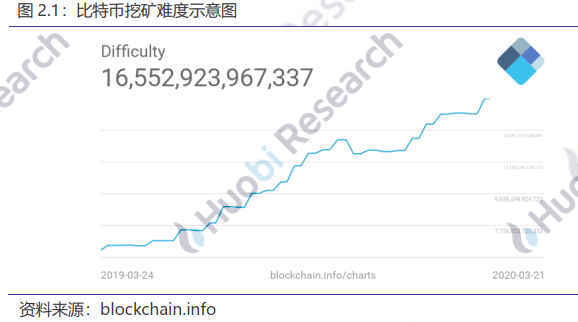
The number of blocks generated by Bitcoin on the entire network fell 14.94%, and the top five rankings have changed from last week. The number of blocks generated by Bitcoin on the entire network during the past week was 814, a decrease of 14.94% compared with last week. , Poolin, BTC.com, AntPool, ViaBTC produce blocks 158, 139, 103, 82, 52 respectively, accounting for 19.41%, 17.08%, 12.65%, 10.07%, 6.39%, and hash power of 18.68 EH / s, 16.43EH / s, 12.17EH / s, 9.69EH / s, 6.15EH / s.
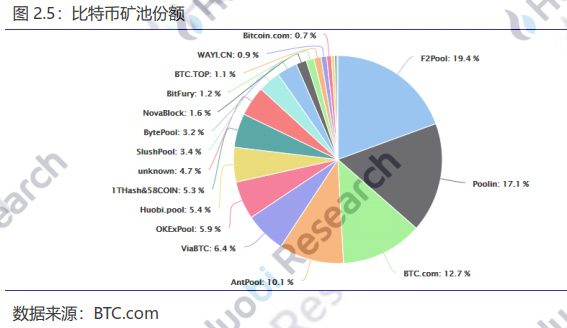
2.2 Activity Statistics
This week, the average size of Bitcoin blocks increased, and the average number of block transactions increased . According to the calculation of blockchain.info data, from March 16, 2020 to March 22, 2020, the average size of each block of Bitcoin this week was 1.22MB, a 7.02% increase from the previous quarter, and the average number of transactions per block was 2286 times, up 2.05% from the previous month.
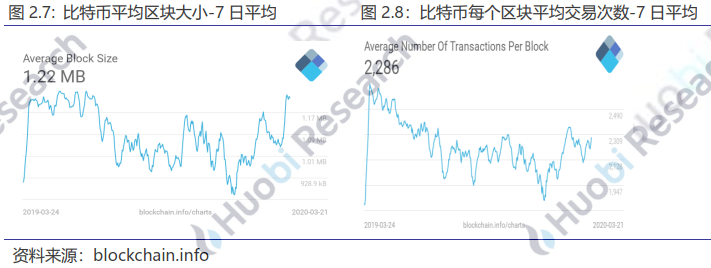
The average number of unconfirmed transactions in Bitcoin this week fell by 1.18%. As of March 22, 2020, the average 7-day unconfirmed number of transactions in Bitcoin was 14,271, a decrease of 1.18% from the previous quarter.
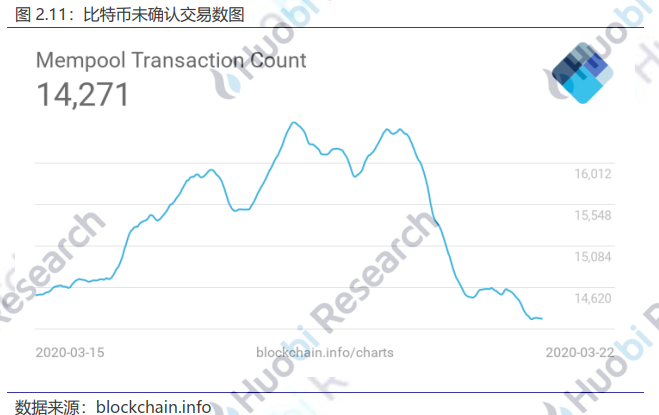
Bitcoin miner fees rose this week and Ethereum miner fees fell. As of March 22, 2020, bitcoin's average daily miner fee was 1.181USD, an increase of 15.67% month-on-month, and Ethereum's miner fee was 0.0796USD, a month-on-month decrease of 28.29%.
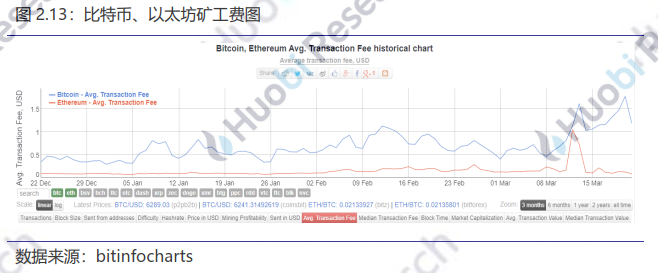
The number of Bitcoin verification nodes has decreased from the previous quarter. As of March 22, 2020, Bitcoin verification nodes reached 10053, a decrease of 1.96% month-on-month, of which 2050 nodes in the United States, accounting for 20.1839%; Germany has 1796 nodes, accounting for 17.87%; China ranked ninth, has 242 nodes, accounting for 2.41%.
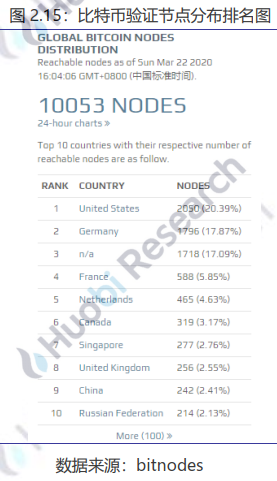
Bitcoin users this week are up from last week. According to the calculation of blockchain.info data, as of March 22, 2020, the total number of blockchain wallet users reached 46,797,409, a 0.44% increase from last week.
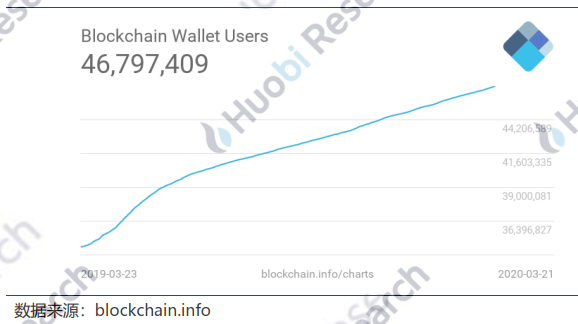
ZSC is the most active github code project this week. From March 16, 2020 to March 22, 2020, ZSC was the most active in github code, with a total of 81 commits this week.
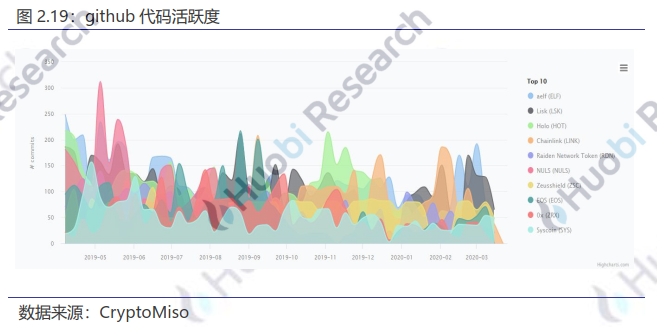
3. Investment and Financing Trends in the Primary Market
A total of 2 investment and financing projects in the blockchain industry were counted this week . The sandbox received a strategic investment of USD 2.01 million, and FundsDLT received a round A investment.
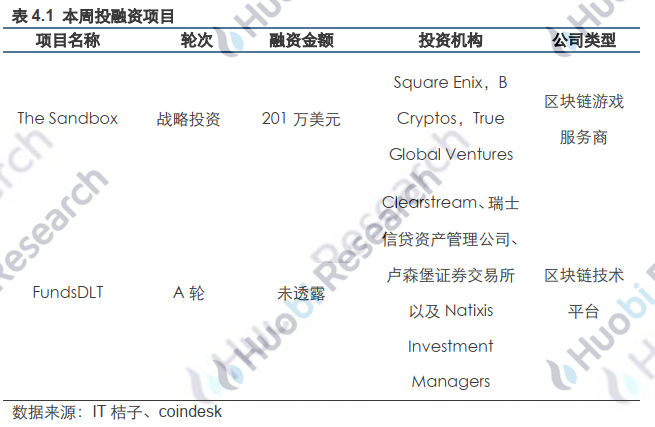
Huobi Blockchain Application Research Institute
about us:
The Huobi Blockchain Application Research Institute ("Huobi Research Institute") was established in April 2016. Since March 2018, it has comprehensively expanded research and exploration in various areas of the blockchain. The main research content includes the blockchain field. Technology research, industry analysis, application innovation, model exploration, etc. We hope to build a research platform covering the complete industrial chain of the blockchain, provide a solid theoretical foundation and trend judgment for the blockchain industry people, and promote the development of the entire blockchain industry.
contact us:
Email: [email protected]
Jianshu Public Account: Huobi Blockchain Research Institute
Website: https://research.huobi.cn
Disclaimer:
1. The Huobi Blockchain Research Institute does not have any associated relationship with the digital assets or other third parties involved in this report that affects the objectivity, independence, and fairness of the report.
2. The information and data cited in this report are from compliance channels, and the source of the information and data has been deemed reliable by the Huobi Blockchain Research Institute, and necessary verifications have been made on its authenticity, accuracy and completeness. , But the Huobi Blockchain Research Institute does not make any guarantee for its authenticity, accuracy or completeness.
3. The content of the report is for reference only, and the facts and opinions in the report do not constitute any investment advice for related digital assets. The Huobi Blockchain Research Institute does not assume any responsibility for losses caused by the use of the contents of this report, unless expressly provided by laws and regulations. Readers should not make investment decisions based solely on this report, nor should they lose the ability to make independent judgments based on this report.
4. The information, opinions and speculations contained in this report only reflect the judgments of the researchers on the date of finalizing this report. Based on industry changes and data information updates in the future, there may be updates of opinions and judgments.
5. The copyright of this report is only owned by the Huobi Blockchain Research Institute. If you need to quote the content of this report, please indicate the source. If you need a large reference, please inform in advance and use it within the allowed range. Under no circumstances shall this report be quoted, abridged, or modified in a way that is contrary to its original intent.
We will continue to update Blocking; if you have any questions or suggestions, please contact us!
Was this article helpful?
93 out of 132 found this helpful
Related articles
- Let's talk about DAO from a human perspective
- Dialogue | The epidemic connects everyone more closely to the digital world blockchain makes it more credible
- You "don't need" DAO: What is the necessity of DAO?
- Industrial Blockchain Weekly Report | The first batch of virtual banks has been internally tested, and the ICT Institute launches a blockchain-based resumption platform
- Under the epidemic, how can blockchain make public welfare easier?
- Dialogue | Community epidemic prevention on the chain, data security can be checked
- What is a block of credit? Speaking from Lightning Loan



